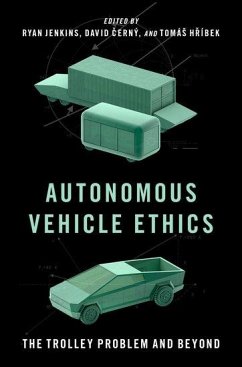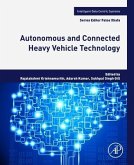Autonomous Vehicle Ethics
The Trolley Problem and Beyond
Herausgeber: Jenkins, Ryan; Hríbek, Tomás; Cerný, David
Autonomous Vehicle Ethics
The Trolley Problem and Beyond
Herausgeber: Jenkins, Ryan; Hríbek, Tomás; Cerný, David
- Gebundenes Buch
- Merkliste
- Auf die Merkliste
- Bewerten Bewerten
- Teilen
- Produkt teilen
- Produkterinnerung
- Produkterinnerung
This book represents a substantial and purposeful effort to move the academic discussion beyond the trolley problem to the broader ethical, legal, and social implications that autonomous vehicles present. There are still urgent questions waiting to be addressed, for example: how AVs might interact with human drivers in mixed or "hybrid" traffic environments; how AVs might reshape our urban landscapes; what unique security or privacy concerns are raised by AVs as connected devices in the "Internet of Things"; how the benefits and burdens of this new technology, including mobility, traffic…mehr
Andere Kunden interessierten sich auch für
![Autonomous and Connected Heavy Vehicle Technology Autonomous and Connected Heavy Vehicle Technology]() Autonomous and Connected Heavy Vehicle Technology164,99 €
Autonomous and Connected Heavy Vehicle Technology164,99 €![Fryewerk 2.0: Concept Vehicle Illustrations by John A. Frye Fryewerk 2.0: Concept Vehicle Illustrations by John A. Frye]() John A. FryeFryewerk 2.0: Concept Vehicle Illustrations by John A. Frye31,99 €
John A. FryeFryewerk 2.0: Concept Vehicle Illustrations by John A. Frye31,99 €![Fryewerk 2.0: Concept Vehicle Illustrations by John A. Frye Fryewerk 2.0: Concept Vehicle Illustrations by John A. Frye]() John A. FryeFryewerk 2.0: Concept Vehicle Illustrations by John A. Frye22,99 €
John A. FryeFryewerk 2.0: Concept Vehicle Illustrations by John A. Frye22,99 €![Porsche 911: 50 Years Porsche 911: 50 Years]() Randy LeffingwellPorsche 911: 50 Years48,99 €
Randy LeffingwellPorsche 911: 50 Years48,99 €![101 Projects for Your Porsche 911, 996 and 997 1998-2008 101 Projects for Your Porsche 911, 996 and 997 1998-2008]() Wayne R. Dempsey101 Projects for Your Porsche 911, 996 and 997 1998-200826,99 €
Wayne R. Dempsey101 Projects for Your Porsche 911, 996 and 997 1998-200826,99 €![An Introductory Guide to Motor Vehicle Maintenance An Introductory Guide to Motor Vehicle Maintenance]() Phil KnottAn Introductory Guide to Motor Vehicle Maintenance37,99 €
Phil KnottAn Introductory Guide to Motor Vehicle Maintenance37,99 €![Welding for Vehicle Restorers Welding for Vehicle Restorers]() Bruce MacleodWelding for Vehicle Restorers24,99 €
Bruce MacleodWelding for Vehicle Restorers24,99 €-
-
-
This book represents a substantial and purposeful effort to move the academic discussion beyond the trolley problem to the broader ethical, legal, and social implications that autonomous vehicles present. There are still urgent questions waiting to be addressed, for example: how AVs might interact with human drivers in mixed or "hybrid" traffic environments; how AVs might reshape our urban landscapes; what unique security or privacy concerns are raised by AVs as connected devices in the "Internet of Things"; how the benefits and burdens of this new technology, including mobility, traffic congestion, and pollution, will be distributed throughout society; and more.
Hinweis: Dieser Artikel kann nur an eine deutsche Lieferadresse ausgeliefert werden.
Hinweis: Dieser Artikel kann nur an eine deutsche Lieferadresse ausgeliefert werden.
Produktdetails
- Produktdetails
- Verlag: Oxford University Press Inc
- Seitenzahl: 528
- Erscheinungstermin: 20. September 2022
- Englisch
- Abmessung: 241mm x 160mm x 45mm
- Gewicht: 826g
- ISBN-13: 9780197639191
- ISBN-10: 0197639194
- Artikelnr.: 63691336
- Herstellerkennzeichnung
- Libri GmbH
- Europaallee 1
- 36244 Bad Hersfeld
- gpsr@libri.de
- Verlag: Oxford University Press Inc
- Seitenzahl: 528
- Erscheinungstermin: 20. September 2022
- Englisch
- Abmessung: 241mm x 160mm x 45mm
- Gewicht: 826g
- ISBN-13: 9780197639191
- ISBN-10: 0197639194
- Artikelnr.: 63691336
- Herstellerkennzeichnung
- Libri GmbH
- Europaallee 1
- 36244 Bad Hersfeld
- gpsr@libri.de
Dr. Ryan Jenkins is an Associate Professor of Philosophy, a Senior Fellow at the Ethics + Emerging Sciences Group at California Polytechnic State University in San Luis Obispo, and a former Co-Chair of the Robot Ethics Technical Committee of the IEEE. He studies the ethics of emerging technologies, especially artificial intelligence, autonomous weapons, and driverless cars. He has served on two NSF grants to study the ethical, legal, and social implications of autonomous vehicles. He has published extensively in academic journals and his work has appeared in public fora including the Washington Post, Slate, and Forbes. Dr. David Cerný is a research fellow at the Institute of State and Law of the Czech Academy of Sciences and the Institute of Computer Science of the Czech Academy of Sciences. He is a founding member of the Karel Capek Center for Values in Science and Technology. His research interests range from normative to applied ethics, primarily focusing on artificial intelligence, robotics, and medical ethics. He has served on two Technology Agency of the Czech Republic grants to investigate the ethical implications of autonomous vehicles and end-of-life decisions. He also served as an expert at the European Commission. Czech media often interview him on issues related to applied ethics, and his work has appeared in public fora. Dr. Tomás Hríbek is a research fellow at the Institute of Philosophy of the Czech Academy of Sciences. Together with David Cerný, he is the founder of the Karel Capek Center for Values in Science and Technology. He has published on topics ranging from philosophy of mind and science, to ethics (particularly bioethics, and more recently the ethics of emerging technologies) and aesthetics. He also teaches at several colleges, including Charles University and Anglo-American University, in his hometown of Prague.
* Acknowledgments
* Contributors
* Introduction
* PART I Autonomous Vehicles and Trolley Problems
* Introduction by David Cerný
* Chapter 1. Ethics and Risk Distribution for Autonomous Vehicles
* Nicholas G. Evans
* Chapter 2. Autonomous Vehicles, the Badness of Death, and
Discrimination
* David Cerný
* Chapter 3. Automated Vehicles and the Ethics of Classification
* Geoff Keeling
* Chapter 4. Trolleys and Autonomous Vehicles: New Foundations for the
Ethics of Machine Learning
* Jeff Behrends and John Basl
* Chapter 5. The Trolley Problem and the Ethics of Autonomous Vehicles
in the Eyes of the Public: Experimental Evidence
* Akira Inoue, Kazumi Shimizu, Daisuke Udagawa, and Yoshiki Wakamatsu
* Chapter 6. Autonomous Vehicles in Drivers' School: A Non- Western
Perspective
* Soraj Hongladarom and Daniel D. Novotný
* Chapter 7. Autonomous Vehicles and Normative Pluralism
* Saul Smilansky
* Chapter 8. Discrimination in Algorithmic Trolley Problems
* Derek Leben
* PART II Ethical Issues Beyond the Trolley Problem
* Introduction by Ryan Jenkins
* Chapter 9. Unintended Externalities of Highly Automated Vehicles
* Jeffrey K. Gurney
* Chapter 10. The Politics of Self- Driving Cars: Soft Ethics, Hard
Law, Big Business, Social Norms
* Ugo Pagallo
* Chapter 11. Autonomous Vehicles and Ethical Settings: Who Should
Decide?
* Paul Formosa
* Chapter 12. Algorithms of Life and Death: A Utilitarian Approach to
the Ethics of Self- Driving Cars
* Stephen Bennett
* Chapter 13. Autonomous Vehicles, Business Ethics, and Risk
Distribution in Hybrid Traffic
* Brian Berkey
* Chapter 14. An Epistemic Approach to Cultivating Appropriate Trust in
Autonomous Vehicles
* Kendra Chilson
* Chapter 15. How Soon Is Now?: On the Timing and Conditions for
Adopting Widespread Use of Autonomous Vehicles
* Leonard Kahn
* Chapter 16. The Ethics of Abuse and Unintended Consequences for
Autonomous Vehicles
* Keith Abney
* PART III Perspectives from Political Philosophy
* Introduction by Tomá Hríbek
* Chapter 17. Distributive Justice, Institutionalism, and Autonomous
Vehicles
* Patrick Taylor Smith
* Chapter 18. Autonomous Vehicles and the Basic Structure of Society
* Veljko Dubljevic and William A. Bauer
* Chapter 19. Supply Chains, Work Alternatives, and Autonomous Vehicles
* Luke Golemon, Fritz Allhoff, and T. J. Broy
* Chapter 20. Can Autonomous Cars Deliver Equity?
* Anne Brown
* Chapter 21. Making Autonomous Vehicle Technologies Matter: Ensuring
Equitable Access and Opportunity
* Madhu C. Dutta- Koehler and Jennifer Hatch
* Part IV Autonomous Vehicle Technology in The City
* Introduction by Tomá Hríbek
* Chapter 22. Fixing Congestion for Whom? The Distribution of
Autonomous Vehicles' Effects on Congestion
* Carole Turley Voulgaris
* Chapter 23. Fulfilling the Promise of Autonomous Vehicles with a New
Ethics of Transportation
* Beaudry Kock and Yolanda Lannquist
* Chapter 24. Ethics, Autonomous Vehicles, and the Future City
* Jason Borenstein, John Bucher, and Joseph Herkert
* Chapter 25. The Autonomous Vehicle in Asian Cities: Opportunities for
Gender Equity, Convivial Urban Relations, and Public Safety in Seoul
and Singapore
* Jeffrey K. H. Chan and Jiwon Shim
* Chapter 26. Autonomous Vehicles, the Driverless City, and the
Pedestrian City
* Tomá Hríbek
* Appendix 1: Varieties of Trolley Pessimism
* Jeff Behrends and John Basl
* Contributors
* Introduction
* PART I Autonomous Vehicles and Trolley Problems
* Introduction by David Cerný
* Chapter 1. Ethics and Risk Distribution for Autonomous Vehicles
* Nicholas G. Evans
* Chapter 2. Autonomous Vehicles, the Badness of Death, and
Discrimination
* David Cerný
* Chapter 3. Automated Vehicles and the Ethics of Classification
* Geoff Keeling
* Chapter 4. Trolleys and Autonomous Vehicles: New Foundations for the
Ethics of Machine Learning
* Jeff Behrends and John Basl
* Chapter 5. The Trolley Problem and the Ethics of Autonomous Vehicles
in the Eyes of the Public: Experimental Evidence
* Akira Inoue, Kazumi Shimizu, Daisuke Udagawa, and Yoshiki Wakamatsu
* Chapter 6. Autonomous Vehicles in Drivers' School: A Non- Western
Perspective
* Soraj Hongladarom and Daniel D. Novotný
* Chapter 7. Autonomous Vehicles and Normative Pluralism
* Saul Smilansky
* Chapter 8. Discrimination in Algorithmic Trolley Problems
* Derek Leben
* PART II Ethical Issues Beyond the Trolley Problem
* Introduction by Ryan Jenkins
* Chapter 9. Unintended Externalities of Highly Automated Vehicles
* Jeffrey K. Gurney
* Chapter 10. The Politics of Self- Driving Cars: Soft Ethics, Hard
Law, Big Business, Social Norms
* Ugo Pagallo
* Chapter 11. Autonomous Vehicles and Ethical Settings: Who Should
Decide?
* Paul Formosa
* Chapter 12. Algorithms of Life and Death: A Utilitarian Approach to
the Ethics of Self- Driving Cars
* Stephen Bennett
* Chapter 13. Autonomous Vehicles, Business Ethics, and Risk
Distribution in Hybrid Traffic
* Brian Berkey
* Chapter 14. An Epistemic Approach to Cultivating Appropriate Trust in
Autonomous Vehicles
* Kendra Chilson
* Chapter 15. How Soon Is Now?: On the Timing and Conditions for
Adopting Widespread Use of Autonomous Vehicles
* Leonard Kahn
* Chapter 16. The Ethics of Abuse and Unintended Consequences for
Autonomous Vehicles
* Keith Abney
* PART III Perspectives from Political Philosophy
* Introduction by Tomá Hríbek
* Chapter 17. Distributive Justice, Institutionalism, and Autonomous
Vehicles
* Patrick Taylor Smith
* Chapter 18. Autonomous Vehicles and the Basic Structure of Society
* Veljko Dubljevic and William A. Bauer
* Chapter 19. Supply Chains, Work Alternatives, and Autonomous Vehicles
* Luke Golemon, Fritz Allhoff, and T. J. Broy
* Chapter 20. Can Autonomous Cars Deliver Equity?
* Anne Brown
* Chapter 21. Making Autonomous Vehicle Technologies Matter: Ensuring
Equitable Access and Opportunity
* Madhu C. Dutta- Koehler and Jennifer Hatch
* Part IV Autonomous Vehicle Technology in The City
* Introduction by Tomá Hríbek
* Chapter 22. Fixing Congestion for Whom? The Distribution of
Autonomous Vehicles' Effects on Congestion
* Carole Turley Voulgaris
* Chapter 23. Fulfilling the Promise of Autonomous Vehicles with a New
Ethics of Transportation
* Beaudry Kock and Yolanda Lannquist
* Chapter 24. Ethics, Autonomous Vehicles, and the Future City
* Jason Borenstein, John Bucher, and Joseph Herkert
* Chapter 25. The Autonomous Vehicle in Asian Cities: Opportunities for
Gender Equity, Convivial Urban Relations, and Public Safety in Seoul
and Singapore
* Jeffrey K. H. Chan and Jiwon Shim
* Chapter 26. Autonomous Vehicles, the Driverless City, and the
Pedestrian City
* Tomá Hríbek
* Appendix 1: Varieties of Trolley Pessimism
* Jeff Behrends and John Basl
* Acknowledgments
* Contributors
* Introduction
* PART I Autonomous Vehicles and Trolley Problems
* Introduction by David Cerný
* Chapter 1. Ethics and Risk Distribution for Autonomous Vehicles
* Nicholas G. Evans
* Chapter 2. Autonomous Vehicles, the Badness of Death, and
Discrimination
* David Cerný
* Chapter 3. Automated Vehicles and the Ethics of Classification
* Geoff Keeling
* Chapter 4. Trolleys and Autonomous Vehicles: New Foundations for the
Ethics of Machine Learning
* Jeff Behrends and John Basl
* Chapter 5. The Trolley Problem and the Ethics of Autonomous Vehicles
in the Eyes of the Public: Experimental Evidence
* Akira Inoue, Kazumi Shimizu, Daisuke Udagawa, and Yoshiki Wakamatsu
* Chapter 6. Autonomous Vehicles in Drivers' School: A Non- Western
Perspective
* Soraj Hongladarom and Daniel D. Novotný
* Chapter 7. Autonomous Vehicles and Normative Pluralism
* Saul Smilansky
* Chapter 8. Discrimination in Algorithmic Trolley Problems
* Derek Leben
* PART II Ethical Issues Beyond the Trolley Problem
* Introduction by Ryan Jenkins
* Chapter 9. Unintended Externalities of Highly Automated Vehicles
* Jeffrey K. Gurney
* Chapter 10. The Politics of Self- Driving Cars: Soft Ethics, Hard
Law, Big Business, Social Norms
* Ugo Pagallo
* Chapter 11. Autonomous Vehicles and Ethical Settings: Who Should
Decide?
* Paul Formosa
* Chapter 12. Algorithms of Life and Death: A Utilitarian Approach to
the Ethics of Self- Driving Cars
* Stephen Bennett
* Chapter 13. Autonomous Vehicles, Business Ethics, and Risk
Distribution in Hybrid Traffic
* Brian Berkey
* Chapter 14. An Epistemic Approach to Cultivating Appropriate Trust in
Autonomous Vehicles
* Kendra Chilson
* Chapter 15. How Soon Is Now?: On the Timing and Conditions for
Adopting Widespread Use of Autonomous Vehicles
* Leonard Kahn
* Chapter 16. The Ethics of Abuse and Unintended Consequences for
Autonomous Vehicles
* Keith Abney
* PART III Perspectives from Political Philosophy
* Introduction by Tomá Hríbek
* Chapter 17. Distributive Justice, Institutionalism, and Autonomous
Vehicles
* Patrick Taylor Smith
* Chapter 18. Autonomous Vehicles and the Basic Structure of Society
* Veljko Dubljevic and William A. Bauer
* Chapter 19. Supply Chains, Work Alternatives, and Autonomous Vehicles
* Luke Golemon, Fritz Allhoff, and T. J. Broy
* Chapter 20. Can Autonomous Cars Deliver Equity?
* Anne Brown
* Chapter 21. Making Autonomous Vehicle Technologies Matter: Ensuring
Equitable Access and Opportunity
* Madhu C. Dutta- Koehler and Jennifer Hatch
* Part IV Autonomous Vehicle Technology in The City
* Introduction by Tomá Hríbek
* Chapter 22. Fixing Congestion for Whom? The Distribution of
Autonomous Vehicles' Effects on Congestion
* Carole Turley Voulgaris
* Chapter 23. Fulfilling the Promise of Autonomous Vehicles with a New
Ethics of Transportation
* Beaudry Kock and Yolanda Lannquist
* Chapter 24. Ethics, Autonomous Vehicles, and the Future City
* Jason Borenstein, John Bucher, and Joseph Herkert
* Chapter 25. The Autonomous Vehicle in Asian Cities: Opportunities for
Gender Equity, Convivial Urban Relations, and Public Safety in Seoul
and Singapore
* Jeffrey K. H. Chan and Jiwon Shim
* Chapter 26. Autonomous Vehicles, the Driverless City, and the
Pedestrian City
* Tomá Hríbek
* Appendix 1: Varieties of Trolley Pessimism
* Jeff Behrends and John Basl
* Contributors
* Introduction
* PART I Autonomous Vehicles and Trolley Problems
* Introduction by David Cerný
* Chapter 1. Ethics and Risk Distribution for Autonomous Vehicles
* Nicholas G. Evans
* Chapter 2. Autonomous Vehicles, the Badness of Death, and
Discrimination
* David Cerný
* Chapter 3. Automated Vehicles and the Ethics of Classification
* Geoff Keeling
* Chapter 4. Trolleys and Autonomous Vehicles: New Foundations for the
Ethics of Machine Learning
* Jeff Behrends and John Basl
* Chapter 5. The Trolley Problem and the Ethics of Autonomous Vehicles
in the Eyes of the Public: Experimental Evidence
* Akira Inoue, Kazumi Shimizu, Daisuke Udagawa, and Yoshiki Wakamatsu
* Chapter 6. Autonomous Vehicles in Drivers' School: A Non- Western
Perspective
* Soraj Hongladarom and Daniel D. Novotný
* Chapter 7. Autonomous Vehicles and Normative Pluralism
* Saul Smilansky
* Chapter 8. Discrimination in Algorithmic Trolley Problems
* Derek Leben
* PART II Ethical Issues Beyond the Trolley Problem
* Introduction by Ryan Jenkins
* Chapter 9. Unintended Externalities of Highly Automated Vehicles
* Jeffrey K. Gurney
* Chapter 10. The Politics of Self- Driving Cars: Soft Ethics, Hard
Law, Big Business, Social Norms
* Ugo Pagallo
* Chapter 11. Autonomous Vehicles and Ethical Settings: Who Should
Decide?
* Paul Formosa
* Chapter 12. Algorithms of Life and Death: A Utilitarian Approach to
the Ethics of Self- Driving Cars
* Stephen Bennett
* Chapter 13. Autonomous Vehicles, Business Ethics, and Risk
Distribution in Hybrid Traffic
* Brian Berkey
* Chapter 14. An Epistemic Approach to Cultivating Appropriate Trust in
Autonomous Vehicles
* Kendra Chilson
* Chapter 15. How Soon Is Now?: On the Timing and Conditions for
Adopting Widespread Use of Autonomous Vehicles
* Leonard Kahn
* Chapter 16. The Ethics of Abuse and Unintended Consequences for
Autonomous Vehicles
* Keith Abney
* PART III Perspectives from Political Philosophy
* Introduction by Tomá Hríbek
* Chapter 17. Distributive Justice, Institutionalism, and Autonomous
Vehicles
* Patrick Taylor Smith
* Chapter 18. Autonomous Vehicles and the Basic Structure of Society
* Veljko Dubljevic and William A. Bauer
* Chapter 19. Supply Chains, Work Alternatives, and Autonomous Vehicles
* Luke Golemon, Fritz Allhoff, and T. J. Broy
* Chapter 20. Can Autonomous Cars Deliver Equity?
* Anne Brown
* Chapter 21. Making Autonomous Vehicle Technologies Matter: Ensuring
Equitable Access and Opportunity
* Madhu C. Dutta- Koehler and Jennifer Hatch
* Part IV Autonomous Vehicle Technology in The City
* Introduction by Tomá Hríbek
* Chapter 22. Fixing Congestion for Whom? The Distribution of
Autonomous Vehicles' Effects on Congestion
* Carole Turley Voulgaris
* Chapter 23. Fulfilling the Promise of Autonomous Vehicles with a New
Ethics of Transportation
* Beaudry Kock and Yolanda Lannquist
* Chapter 24. Ethics, Autonomous Vehicles, and the Future City
* Jason Borenstein, John Bucher, and Joseph Herkert
* Chapter 25. The Autonomous Vehicle in Asian Cities: Opportunities for
Gender Equity, Convivial Urban Relations, and Public Safety in Seoul
and Singapore
* Jeffrey K. H. Chan and Jiwon Shim
* Chapter 26. Autonomous Vehicles, the Driverless City, and the
Pedestrian City
* Tomá Hríbek
* Appendix 1: Varieties of Trolley Pessimism
* Jeff Behrends and John Basl








